- Home
- Sara Shepard
All the Things We Didn't Say Page 12
All the Things We Didn't Say Read online
Page 12
‘You have any trouble getting down here?’ Dr Hughes asked, spreading her napkin on her lap. ‘I heard there was a water main break uptown.’
‘No,’ I said. ‘I only had to come across the bridge, from Brooklyn Heights.’
‘Ah.’ She held up a crooked, bony finger. ‘Right. You’re in Brooklyn. For some reason I keep thinking you’re uptown. So many other students are, I guess.’ She leaned forward. ‘So. Let’s talk about your fellowship application. I got everything. It all looks good.’
I blushed. ‘Thanks.’
‘You have one more class you need to take to graduate, right?’
‘It’s just an independent study. I can work on it this summer.’
‘Your essays make sense. Your recommendations, of course, are impeccable. As are your grades. If you want to study genetics, Dublin is perfect right now.’ She laced her fingers together. ‘But there’s a problem. You forgot to submit your personal statement. You read the application, right? You were supposed to include one.’
‘I read it.’ I scratched the back of my elbow, listening to Mrs Claus’s plastic body parts squeak. ‘I just…I didn’t know what to say.’
‘And so you just didn’t include it at all?’
‘Yeah. Basically.’
‘That’s not like you.’
And it wasn’t, from what she knew of me. For the remainder of her class, I’d aced every single one of her exams. I loved crossing green flowering plants with white flowering ones and knowing exactly what I would get. I loved locating a mutation on a gene or an indication that a certain gene to code a protein-making enzyme was present.
‘Do you want to do this?’ Dr Hughes inspected me carefully.
‘I do. I think I do. It’s just…I don’t know. When I see the words, Write a personal statement, I just freeze up.’
She dumped some sugar into her coffee, which had magically appeared before her. ‘It’s a simple paragraph. Why you like genetics. Why you want to study this before going to medical school. Why this field speaks to you. We’re not talking Shakespeare.’
I sighed.
‘Perhaps you don’t feel comfortable with making a big change like this right now.’
‘No, I am,’ I answered slowly. Then, realization wound around me. She knew.
I knew this, of course. I shouldn’t have been so surprised.
When she leaned forward again, the vinyl booth made a helpless, merciful squeak. ‘I heard about your father. The type of treatment he’s going to try.’
I swallowed very slowly.
‘Leon mentioned it to us,’ she added.
Leon was my father’s partner at the lab. And Dr Hughes’s husband was Leon’s best friend. That first time Dr Hughes and I met here, she’d asked me if I had any other doctors in my family, and I said my father was a medical researcher, studying melanoma. She let out a note of delight and said what a coincidence; a friend of her husband’s did the exact same thing. And then I laughed. ‘It’s not Leon Kimball, is it?’ Dr Hughes’s mouth parted and she said, ‘Yes, how do you know that?’ And it went from there. Afterward, my father told me he had met Dr Hughes and her husband plenty of times-she often came into the office to say hello to Leon, to pick him up so they all could go to lunch. ‘Why didn’t you mention it?’ I asked my father angrily. ‘Hadn’t Leon told you that his best friend’s wife teaches in the biology department at NYU? Isn’t that something that would stick out in your mind, considering I’m a biology major?’ My father had blankly shrugged, telling me not to be so hard on him, that he had a lot on his mind.
‘It starts tomorrow, doesn’t it?’ Dr Hughes asked gently.
‘That’s right,’ I answered quietly.
‘Does it make you uncomfortable that we’re talking about this?’
‘It’s fine.’ Pickle, I thought-a little sadly.
‘Where is he now?’
‘He’s at…home. But, I mean, he’s okay. Really.’
‘It’s just that, I want you to know what you’d be getting yourself into. This is an amazing opportunity for you, if you want it. But it’s a lot of money we’re giving away, the stipend and the travel and the tuition. Please don’t think I’m trying to pressure you, or that I’m not sensitive to the magnitude of your situation right now, but there are other students who could use the scholarship if you’re not interested. And it does mean you’d be in another country for quite a while. It would probably be good to know, one way or another, which way you’re leaning.’
I’d known this whole time she could only sponsor one student. There were so many other people begging for this kind of attention.
‘My dad has help,’ I said hoarsely. ‘There’s a woman there, Cora, who is sort of…I don’t know. His assistant, I guess. I mean, she cleans the house, she makes sure he’s taking things…I don’t know what else. But she’s always there. She lives there. I arranged it. I mean, I’m there, too…and I’m going to be taking him to his actual appointments. I guess people wake up disoriented, so…’
I began to pick apart my paper napkin. ‘It’s not as if he’s really…ill. He just gets sad. His brain is resistant to drugs, we think. Apparently they do the…procedure all the time. They say he won’t feel anything.’
I trailed off. My voice was shaking too much.
‘I know that.’ Dr Hughes folded her hands. ‘It’s none of my business. I shouldn’t have brought it up.’ She drained her coffee, put her napkin on the table, laid down a few crumpled bills, and stood. I followed. ‘You know what you can handle. I trust you. Just turn in the essay and the statement and I’ll put in the paperwork.’
‘Okay,’ I said. ‘Good.’
‘I’m sorry, again,’ she added.
‘It’s all right,’ I answered, a beat too late. ‘I’m sorry.’ Although I wasn’t sure what I was sorry for-showing emotion, maybe.
On that snowy day a few months ago when Dr Hughes and I first made the connection-‘You’re that Richard Davis’s daughter?’ she’d asked-her face had registered a small, unrehearsed moment of horror. It was the look. The look that told me that Leon had told her all he knew and had witnessed-which included a few of my father’s public breakdowns.
I allowed the look to cross her face without challenging it. I pretended not to see it at all, deciding to give her a chance to have a new, more tempered response. ‘My father’s not doing so well right now,’ I’d said, my eyes on the table, giving her space to properly react. ‘He has clinical depression. He’s been on disability for a while, but I think he’s going to have to resign from the practice altogether.’
And she got to say, ‘Yes, Leon mentioned it. I’m so sorry. It’s got to be hard.’
Perhaps that was why Dr Hughes didn’t intimidate me: I loved the fearless way she taught, but I know she was just as impressionable and sensitive as anyone. When I left the diner, that first time, I thought about how I let her reaction pass by without commenting. It was the easiest thing to do, of course-if I had called her out on it and asked her to explain, then I would have had to explain, which might have meant admitting everything that scared me.
And then, seconds later, I felt somehow responsible-perhaps there could have been a way for me to have warned Dr Hughes, told her who my father was in advance so she could have her moment of horror in private. But warned her how, exactly? I felt so uncomfortable with myself and the situation, I stopped in the middle of the sidewalk, closed my eyes, clenched up my fists, and breathed. When I opened my eyes, I was so amazed that the submarine-round windows of the St Vincent’s medical facility were still there. And the Two Boots Pizza take-away across the street. The entire city was in its right place. I sort of thought it couldn’t be.
12
Later, when I unlocked the front door to the apartment, all of the dogs-Fiona, Wesley, Skip, and Gracie, the Smitty dog-greeted me. ‘Where’s Dad?’ I asked them, their eyes wet and bright. They ran excitedly into the living room, comprehending. My father was in his usual spot on the couch, propped
up on his knees and looking over the back of it at something out the window. Seven glasses of water, all at varying levels, were on the coffee table, along with a bunch of newspapers and the TV remote.
‘Hi,’ I announced.
He jumped and turned around. ‘Summer.’
He was wearing the t-shirt and gym shorts I had given him the Christmas of my freshman year, during one of his active spells when he said he was going to start lifting weights at the Y. And even though I saw him every day, I still wasn’t used to the beard, or that his hair was so much longer, or that he wore oversized, square glasses instead of contacts. He had gained thirty pounds from the latest drug he was on. When he took other types of medications, he drooled. Or he twitched, an arm or a thigh, the side of his hip or an eyelid. When he turned his hand a certain way, I saw the mark from the snow globe in the pit of his palm. There were new scars, too, as distinct as tattoos: cross-hatchings on his elbow from the time he broke a plate, the half-moon on his wrist from the hunting knife, the puffy, wrinkled crater near his collarbone from the lit cigarette.
‘They towed another car,’ my father announced, his eyes bright and wide. The dangerous look. ‘The blue Volvo, the bastards.’
‘Ah.’ I dropped the apartment keys in the bowl on the credenza.
‘It was this morning. Three trucks. And the police came this time. It must have been stolen. They surrounded the car.’
He hefted the window open, cold wind swirling in. He put one hand on his hip. ‘I’m thinking that white Lincoln might be next. It’s got a sticker on it. See?’
I looked at the white car he was pointing at. ‘Uh huh.’ I stepped away from the draft, leaning against the credenza. I gazed at an old photo of my father and me standing at the top of a snow-covered hill in Prospect Park, wearing snow pants and heavy coats and carrying a single plastic sled between us. We always used to go down the hill using just one sled, my father lying on his stomach, me piled on top of him.
‘How do you feel today?’ I asked.
‘Like shit,’ he singsonged, not turning from the window.
‘What kind of shit? Cat shit? Dog shit?’ I never meant to sound frustrated, but I always came off that way.
In another room, one of the dogs barked.
‘Where’s Cora?’ I asked, trying to soften my voice.
My father pressed his head against the glass of the window. ‘I let Cora go. Look! Didn’t I tell you? Here comes the tow truck. I thought they’d give that Lincoln another couple days, but I guess not.’
‘You fired Cora?’ I sank into the couch. ‘Why?’
‘Summer! This is our lucky day.’ He pointed at the tow truck. ‘Watch how they load it up. Have you ever seen this? It’s beautiful.’
‘Dad. Why did you fire her?’
His shoulders lowered. He turned around and picked up the rain stick that was leaning up against the couch. It was supposed to simulate the sounds of the rainforest; he’d bought it a few months ago when we went into the Nature Store. Sometimes, late at night, I heard him turning it over and over, a million tiny downpours. ‘I didn’t need her,’ he said, sulking. ‘She was always here. She was watching me.’
‘Of course she was always here! That’s her job, to be here!’
‘She brought a Neil Diamond CD here. Neil Diamond, Summer.’
‘I’m sorry.’
‘Even your mother didn’t listen to Neil Diamond.’ He shuddered. ‘I’m fine. This is so exaggerated.’
‘You think so?’
‘I feel all right. I’ve been feeling all right.’
At least he was talking today. At least he was watching the cars. Some days, he couldn’t even do that. I wondered if I should call up the clinic in the hospital and cancel the whole thing. Because you couldn’t do just one treatment and decide, Nah, I don’t like it. Once you started, you had to do all six. Or eight. Or however many the doctor deemed appropriate. For my father, the doctor had decided on eight. Words repeated in my head: He will have eight seizures. His brain will be electrocuted eight times.
‘So do you want me to cancel tomorrow?’ I asked quietly. ‘Is that what you want?’
He didn’t answer. Outside, the guy operating the tow truck attached the illegally parked Lincoln to its hitch. My father’s shoulders hunched.
‘I’m going to call Cora.’ I walked into the hall toward the kitchen, all the dogs following. ‘She needs to come back. She’ll come back, right? You didn’t say anything really terrible to her?’
‘Summer…’ My father was behind me fast.
I curled my hand over the receiver. ‘What?’
He gave me a pleading, desperate look. Then, without answering, he walked into the kitchen, bumping a stack of mail teetering precariously on one of the island barstools. A magazine fell to the floor. On the back was an ad for perfume: a naked woman kissing a naked man. I turned the magazine over. Vogue.
‘I thought I cancelled this.’ I held it up to show him.
He shrugged. ‘I renewed it.’
‘Dad…’ I slammed it down on the island too hard. Some of the subscription renewal forms fell out and slid across the tile.
‘What? I might read Vogue. Ever think that?’
‘You wouldn’t read Vogue.’ I turned it over and looked at the mailing address. RICHARD DAVIS. At least it wasn’t in her name. ‘I don’t understand these magazines.’ I held up the cover, Cindy Crawford in a bikini. ‘She looks constipated.’
‘I think she looks nice. She looks like a woman.’ He glanced at me.
‘What’s that supposed to mean?’
‘What’s what supposed to mean?’
‘That look.’
He flipped through the mail. ‘I didn’t give you any looks.’
‘What, I should go around wearing a bikini like she does?’
‘No. Of course not.’ He bent back the edge of a flyer. ‘Although, it wouldn’t kill you to wear something other than jeans once in a while.’
‘There’s nothing wrong with wearing jeans,’ I snapped.
‘Except that a dress is more ladylike.’
And a suit is more masculine, instead of pajama pants. ‘Got me there. You win. Some day when I go off in the world, I’ll wear lots of dresses. Some day when I leave.’
I should have known better. My button: jeans. His: leaving. But who dared press the buttons of someone who was depressed? Someone who could turn on a dime, and-just like he was doing now-start to cry? My father shut his eyes and tried to hold it in. Who dared do this? What dark, evil person?
I crumpled. ‘Dad, no…stop. Let’s not do this.’
‘I wish I were someone else. I wish I weren’t me.’
‘But…come on. You’re wonderful.’
‘No.’
‘Dad.’
I leaned into the crook of his neck, but he refused to touch me. ‘I can’t have you mad at me. You’re my good girl.’
‘I’m not mad at you.’
‘Yes you are. You want to leave.’
I leaned against the fridge. It’s a huge opportunity, Dr Hughes said about the fellowship. You’ll be away from home. I had told my father about the fellowship-that it was a prestigious chance to study in my field. I changed one detail, however: I told him it was in New York, not wherever the interesting fieldwork was happening overseas-in my case, Dublin. I didn’t know I was going to get this far in the application process. It just happened. Dr Hughes had said, Apply, you’ll certainly get it, we all believe in you, but I really hadn’t thought she’d meant it.
Later, I told myself. Tell him later. Tell him everything later. I thought of the flyer I found the other day, the one with her name printed in large block letters, a date, a place, a topic. I’d kept that from him, too.
He looked straight at me. ‘I’m terrified, Summer. Of tomorrow. I don’t know if I want to do it.’
Then don’t, I wanted to say. ‘But it might help you feel better.’
‘What if it doesn’t?’
‘It will.’
I didn’t want to take him to the procedure tomorrow, either. It sounded medieval. When trying to imagine how it might work, I felt like I was wandering into a wilderness where I had no compass or bearings.
‘Are you sure?’ he asked.
I nodded furiously. ‘The doctor says eighty per cent of patients feel better.’ I held on to anything. I held on to percentages, hearsay, catchphrases.
‘Eighty per cent? But that means there are twenty per cent that don’t.’
‘You’ll feel better,’ I assured him. ‘Don’t worry about it. So what are you going to do today?’
He shrugged.
‘Do you want to do something? Go out to lunch?’
‘I don’t think so.’ He glanced at me. ‘You know what you should do today? You should give that coat back.’
I half smiled. I had taken a poncho from someone at a party; I’d told him it was an accident, but he wouldn’t let it drop. ‘The coat’s owner lives in the Bronx,’ I said. ‘That’s an hour away by train.’
He opened Vogue to the middle. ‘You really shouldn’t go around stealing coats that aren’t yours. At least you could have taken one with money in the pockets, you know?’
‘True,’ I laughed.
He leaned in for a hug. He smelled as he always had, like cinnamon gum and soap. It was comforting to think that his smell hadn’t changed, even though everything else about him had. If I closed my eyes and breathed in, I could almost imagine him as the man he was when I was eight, the father in the leather-framed picture on the credenza. It had just snowed, and he was standing on a hill in Prospect Park, a plastic sled in hand, a red, pilly hat coming to a point on the top of his head. I was running toward him, burying myself in the soft folds of his coat, and in seconds, we would pile onto the sled and go down the hill together.

 Heartless
Heartless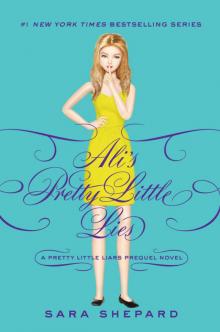 Alis Pretty Little Lies
Alis Pretty Little Lies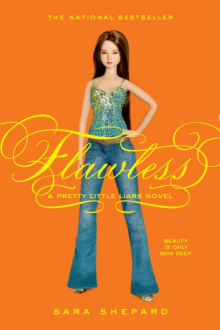 Flawless
Flawless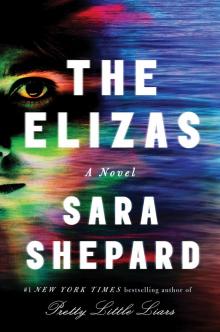 The Elizas
The Elizas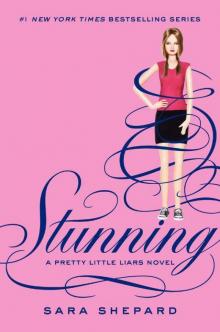 Stunning
Stunning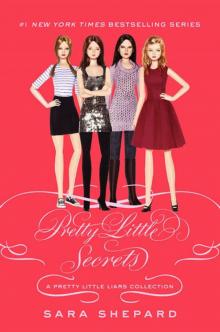 Pretty Little Secrets
Pretty Little Secrets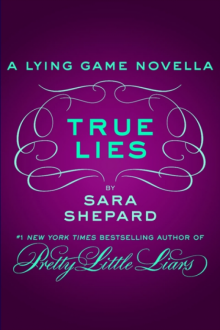 True Lies
True Lies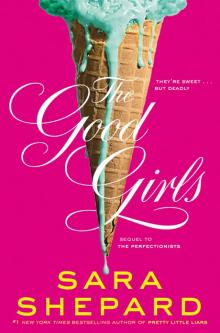 The Good Girls
The Good Girls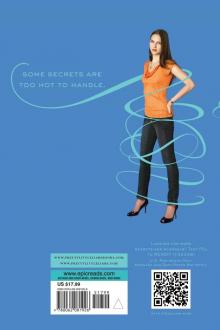 Burned
Burned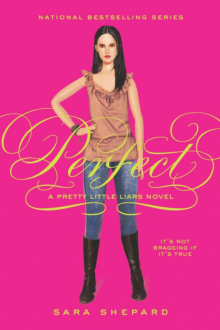 Perfect
Perfect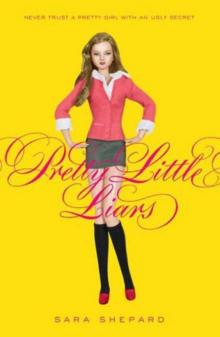 Pretty Little Liars
Pretty Little Liars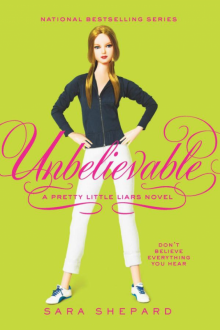 Unbelievable
Unbelievable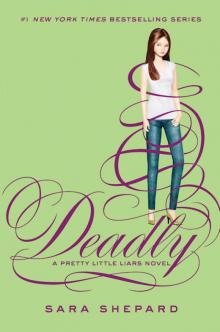 Deadly
Deadly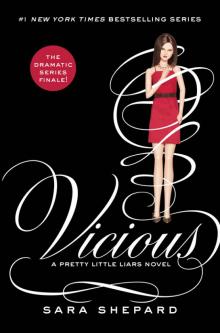 Vicious
Vicious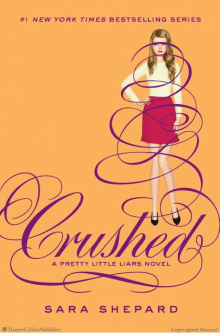 Crushed
Crushed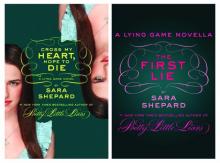 The First Lie
The First Lie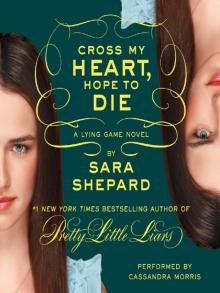 Cross My Heart, Hope To Die
Cross My Heart, Hope To Die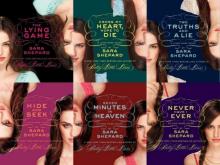 The Lying Game
The Lying Game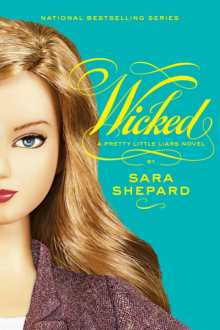 Wicked
Wicked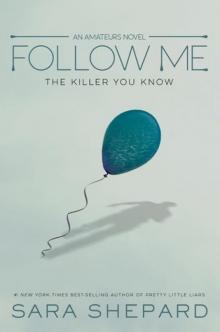 Follow Me
Follow Me Seven Minutes in Heaven
Seven Minutes in Heaven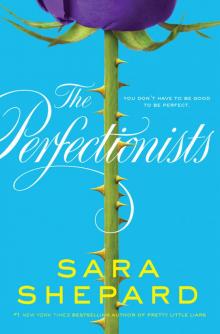 The Perfectionists
The Perfectionists Killer
Killer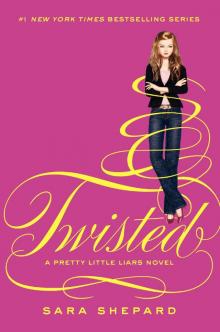 Twisted
Twisted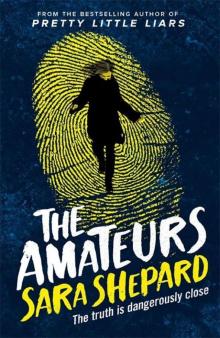 The Amateurs
The Amateurs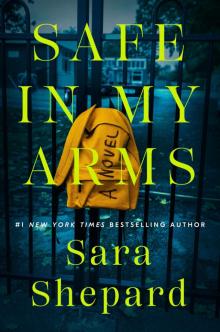 Safe in My Arms
Safe in My Arms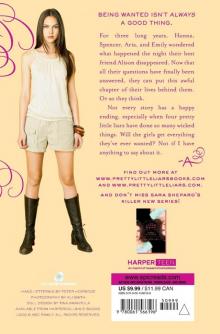 Wanted
Wanted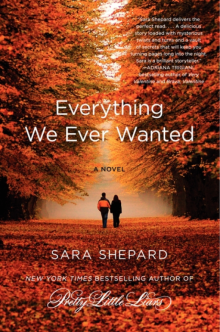 Everything We Ever Wanted
Everything We Ever Wanted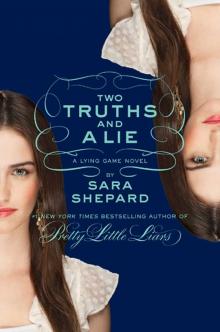 Two Truths and a Lie
Two Truths and a Lie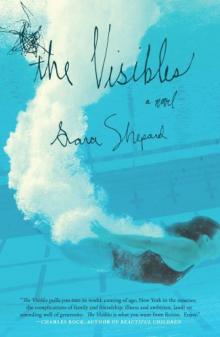 The Visibles
The Visibles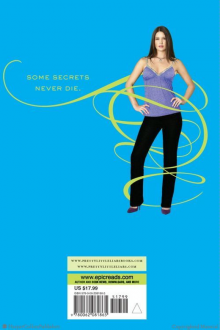 Ruthless
Ruthless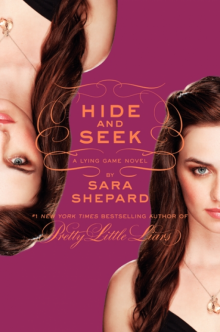 Hide and Seek
Hide and Seek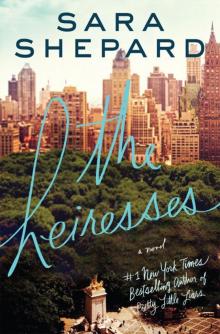 The Heiresses
The Heiresses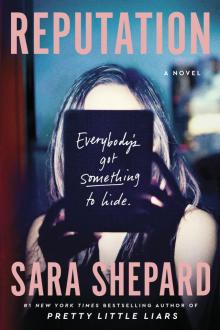 Reputation
Reputation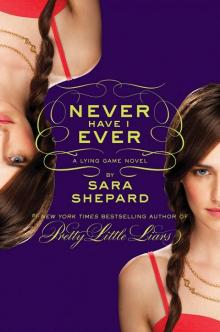 Never Have I Ever
Never Have I Ever Toxic
Toxic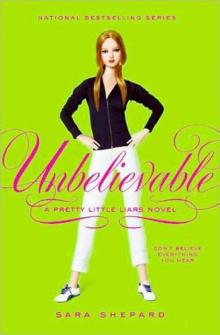 Unbelievable pll-4
Unbelievable pll-4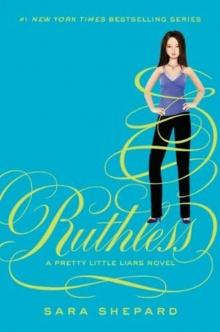 Ruthless pll-10
Ruthless pll-10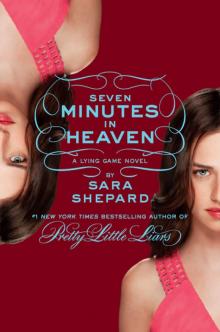 Seven Minutes in Heaven tlg-6
Seven Minutes in Heaven tlg-6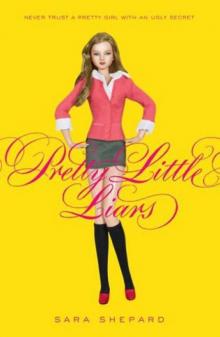 Pretty Little Liars pll-1
Pretty Little Liars pll-1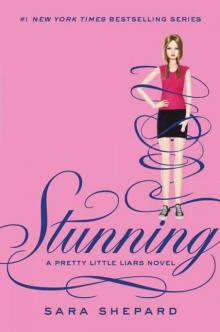 Pretty Little Liars #11: Stunning
Pretty Little Liars #11: Stunning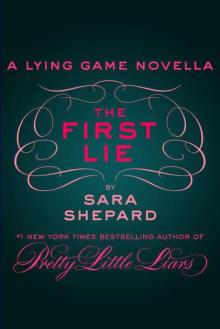 4.5 The First Lie (the lying game)
4.5 The First Lie (the lying game)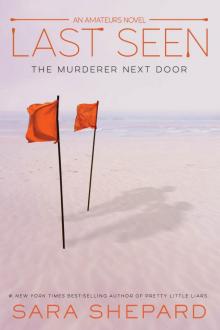 The Amateurs, Book 3
The Amateurs, Book 3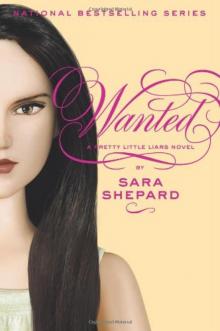 Wanted pll-8
Wanted pll-8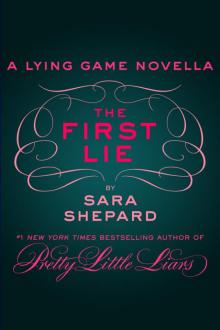 Lying Game 00: The First Lie
Lying Game 00: The First Lie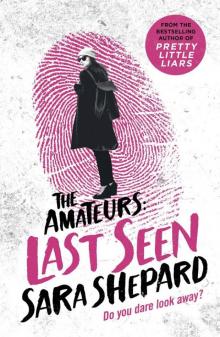 The Amateurs: Last Seen
The Amateurs: Last Seen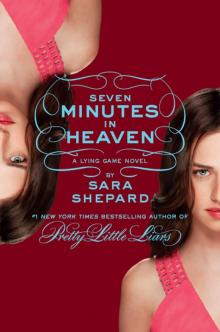 The Lying Game #6: Seven Minutes in Heaven
The Lying Game #6: Seven Minutes in Heaven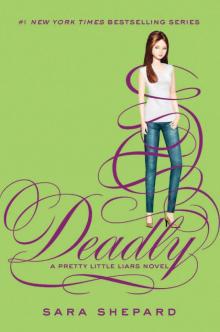 Pretty Little Liars #14
Pretty Little Liars #14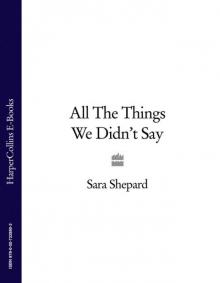 All the Things We Didn't Say
All the Things We Didn't Say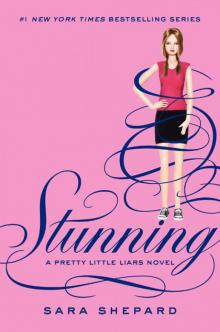 Stunning pll-11
Stunning pll-11 Heartless pll-7
Heartless pll-7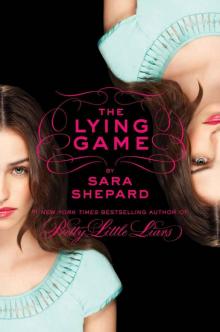 The Lying Game tlg-1
The Lying Game tlg-1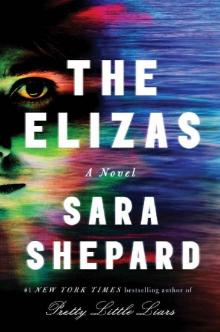 The Elizas_A Novel
The Elizas_A Novel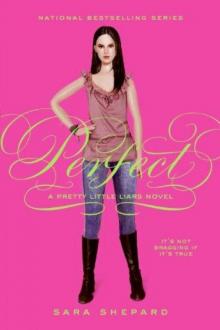 Perfect pll-3
Perfect pll-3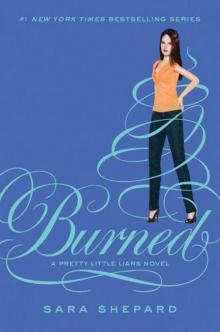 Burned pll-12
Burned pll-12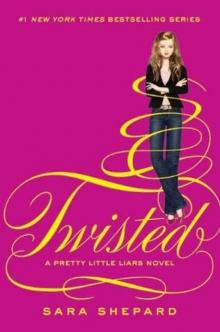 Twisted pll-9
Twisted pll-9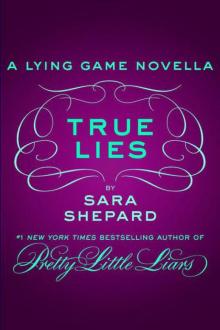 True Lies: A Lying Game Novella
True Lies: A Lying Game Novella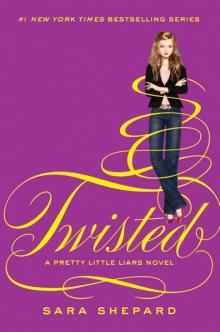 Pretty Little Liars #9: Twisted
Pretty Little Liars #9: Twisted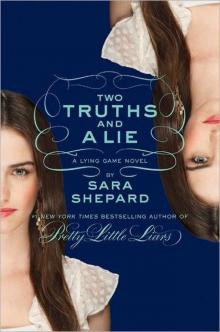 Two Truths and a Lie tlg-3
Two Truths and a Lie tlg-3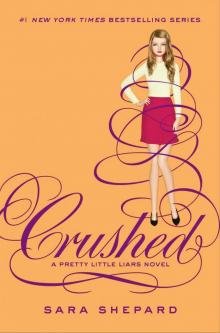 Crushed pll-13
Crushed pll-13 Pretty Little Liars #15: Toxic
Pretty Little Liars #15: Toxic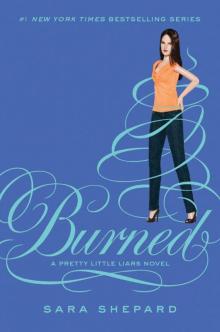 Pretty Little Liars #12: Burned
Pretty Little Liars #12: Burned Killer pll-6
Killer pll-6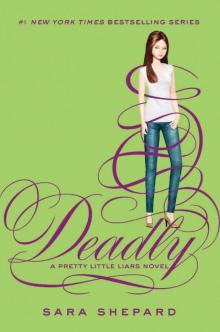 Pretty Little Liars 14: Deadly
Pretty Little Liars 14: Deadly